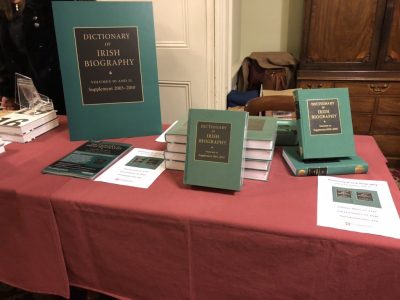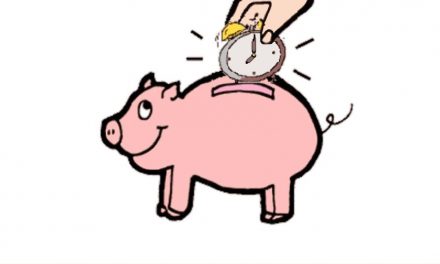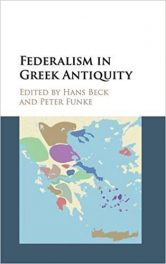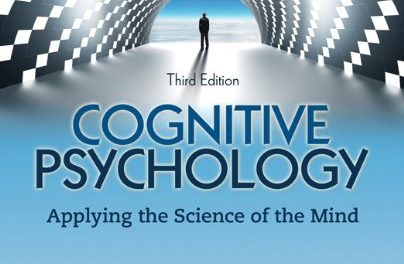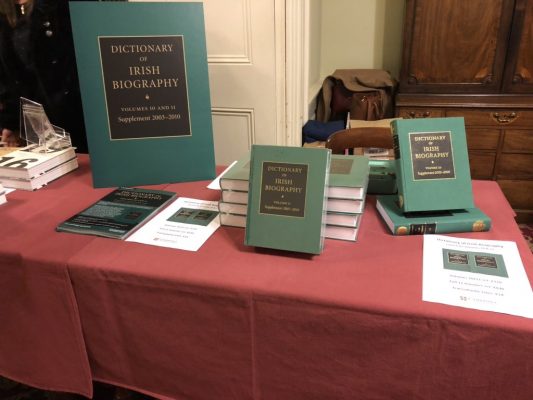 Editors: James McGuire and James Quinn
Editors: James McGuire and James Quinn
Publisher: Cambridge University Press & Royal Irish Academy – 11,285 pages
Book Review by: Sonu Chandiram
This work of 11 volumes (weighing over 56 pounds) consists of a 9-volume set published in 2009, plus two later supplements, contains 10,000+ biographies of prominent men and women born in Ireland, and Irish men and women born worldwide, up to and including those who died in the year 2010.
The nine-volume work is a comprehensive and authoritative biographical reference work available both in print and online. The nine-volume set contains over 9,000 entries covering the lives of over 9,700 people, who died from the earliest times up to 2002, including many born in modern times that were not included in other Irish biographical compilations.
The first of the two supplements – Volume 10 – contains biographies of over 300 Irish men and women who died in the years 2003 to 2006, including 82 other individuals who died before 2002 who were inadvertently omitted in the initial nine volumes.
The second supplement – Volume 11 – consists of biographies of 300-plus Irish men and women who died in the years 2007 to 2010, including 75 other people who died before 2002, (the cut-off point for the initial set of nine volumes) not included in the nine-volume set.
The subjects of the biographies in this vast collection, cover a wide representation of society, including, and not limited to these fields of endeavor: academics, acting, administration, architecture, art, broadcasting, business, entertainment, film, journalism, law, literature, medicine, music, politics, scholarship, science, social work, sports, theater, and writing.
This extensive compilation of biographies reflects the expert advice and contributions of over 700 people. The biographies range in length from just 200 words constituting short summaries, to as many as 15,000 words that constitute detailed assessments.
While the editors (including members of the board of editors mentioned at the end of this book review) had no absolute rules for choosing people to be written about in any of the volumes of this work, a number of useful criteria were used in the selection process:
- The posthumously famous or notorious
- Contemporary figures acknowledged as significant in their own day but subsequently forgotten
- Those unrecognized in their day, whose achievement or significance has since been recognized (e.g. scientists or medical figures)
- The holders of high office, whom a reader might expect to find in a national biographical dictionary, such as a senior government minister or an archbishop of Armagh
- Those who achieved high professional recognition, including distinction in scholarship, science, or professional life, even if little known to the general public
- Those associated with particularly well-known events
- Innovators, pioneers, reformers (e.g. the first woman to hold a public office)
- Those with intrinsically interesting careers
Here below is an excerpt from an example of a typical biographical entry – this one is on the actor Stephen Boyd, who won a Golden Globe Award for Best Supporting Actor in Ben Hur:
Boyd, Stephen (1928-1977) was born William Miller on 4 July 1928 at Glengormley near Belfast. His took his mother’s maiden name for the stage, and became a U.S. citizen under that name in 1963. He began acting with the Carmoney Amateur Dramatic Society, making his professional stage debut at the age of 16 before graduating to the Ulster Theatre Group. His voice became familiar as the RUC man in BBC Northern Island’s long-running radio series ‘The McCooeys”.
After a short spell in Canada he worked in England, making an uncertain living in repertory theater and securing an occasional television part. While working as a doorman at the Odeon cinema in Leicester Square, he scored an introduction to the director Alex Korda, who gave him a contract with his London Film Company.
After several roles in various movies in the 1950s, his big break came when William Wyler cast him as Messala in Ben-Hur in 1959. His portrayal of Messala, Ben-Hur’s Roman boyhood friend turned mortal enemy, won him a Golden Globe from the Hollywood Foreign Press Association and made him an international star. In the famous chariot race Boyd and Charlton Heston did almost all their own driving
Unquestionably this is the world’s largest collection and most comprehensive compendium of biographies of notable Irish personalities. The eleven-volume Dictionary of Irish Biography is an outstanding achievement entailing numerous years of research and scholarship by the editors and hundreds of contributors of content.
This volume is well worth the investment for students, teachers, and writers of Irish history. It is particularly rewarding to those who want to get special glimpses on the lives of numerous famous (and infamous) Irish men and women, whom they idolize and are curious about.
Editors:
James McGuire is an early modern historian, who taught Irish history at University College Cork and afterwards at University College Dublin. Join editor of Irish Historical Studies (1987-92), he was appointed chairman of the Irish Manuscripts Commission in 2013, and in 2007 was elected a member of the Irish Royal Academy.
James Quinn’s specialist interest is in the writing of Irish history in the nineteenth century. He is the author of two biographies: Soul on Fire A Life of Thomas Russell (2002) and John Mitchel (2008).
Board of Editors (for all volumes)
Aidan Clarke, Ronan Fanning, K. Theodore Hoppen, Edith Mary Johnston-Liik, James McGuire, Maureen Murphy, and James Quinn.

